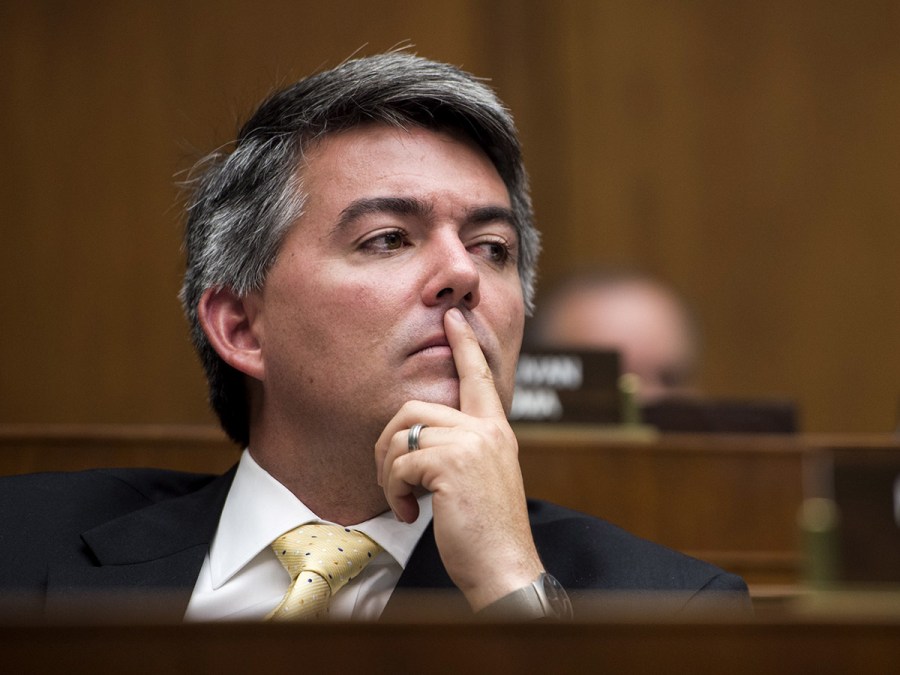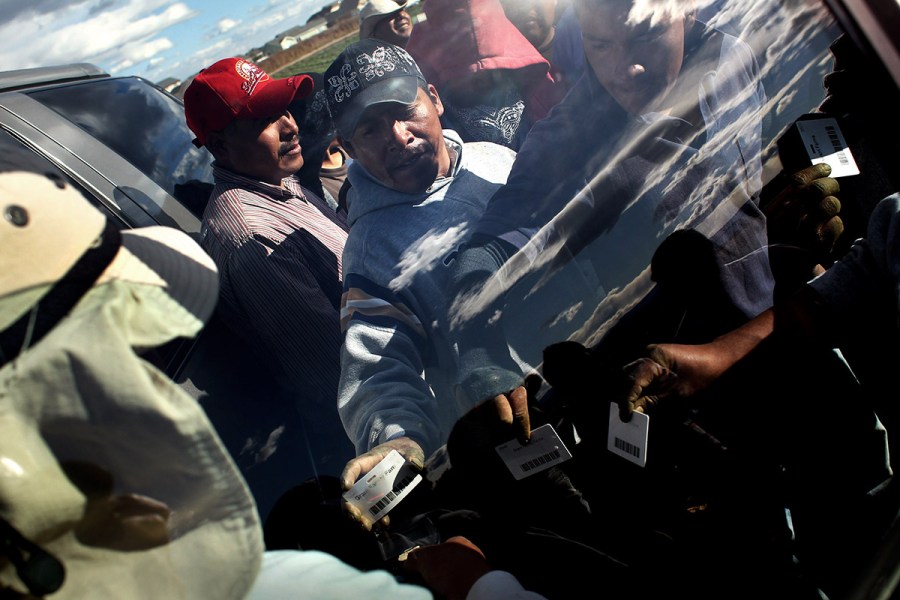FORT MORGAN, CO – Jose Munoz can’t understand why Congressman Cory Gardner won’t give him a straight answer on immigration.
Munoz, a 25-year old volunteer with the Colorado Immigrant Rights Coalition, was one of many attendees at Gardner’s first town hall of the summer eager to hear their congressman address the topic. Just a week earlier on July 29, Gardner met privately with group members who left feeling encouraged.
According to participants, Gardner said that he favored a more “humane” approach to keeping immigrant families together and expected House legislation to include “earned legalization” for undocumented immigrants. That’s short of a path to citizenship, but it would still be a significant step that could radically improve his family’s living situation. Munoz, whose father works on a nearby farm, is in removal proceedings over a DUI arrest years ago.
But when the audience at the August 5 town hall, about half of whom are Latino, confronted Gardner with the same questions, it was as if that earlier meeting never happened. Asked how he would protect families from being separated by deportation, the Colorado Republican pivoted to the importance of cracking down on illegal immigration.
“Once we address those questions of security and enforcement, then we can have the conversation about what to do with those 11 million undocumented,” Gardner said.

At times Gardner seemed to conveniently misinterpret requests for more detail. One attendee asked: “What are the requirements to qualify for the immigration reform?” Gardner took this as a cue to restate his policy requirement that real “reform” meant a series of small bills dealing with border security, internal enforcement measures, and a guest worker program. Another asked: “Do you support immigration reform – and if so, for whom?”
“Maybe I’m not the following the question,” the congressman replied: “It’s for all of us!”
Gardner is one of about 100 potential Republican swing votes that immigration advocates have identified based on their personal views, their district’s demographics, and the regional economy. Without these GOP votes, meaningful immigration reform is unlikely to pass the House.
National reform groups like America’s Voice and the National Immigration Forum prepared for months to court them over the summer recess, working with local groups like CIRC to identify the most influential community voices sympathetic to the cause. In Gardner’s district alone, the advocates scheduled events with pro-reform business executives, farmers, Latino groups, pastors, and law enforcement officials.
But for all their work, Gardner is hesitant to endorse a broad legalization plan along the lines of the bipartisan Senate bill that passed in June. At best, he’s floated a smaller fix for people who, like Munoz, were brought to the country as children.
“He says ‘border first,’” Munoz told MSNBC. “In the meantime, we’re splitting up families.”
Munoz was mystified at first by Gardner’s apparent intransigence. Then he got in his car and followed Gardner to his second town hall of the day in nearby Akron–the seat of 97% white Washington County–and things started to make more sense.
Here, constituents talked about President Obama’s phony birth certificate and how Gardner will stop the president from using a “dictator process” to claim a third term. Turning to immigration, one attendee complained, “I don’t believe there are only 11 million illegals in the country–and more are coming.” Another wanted to station returning troops along the Mexican and Canadian border.

After the Akron event, two middle-aged women buttonholed Gardner to complain that his proposals for guest workers and a streamlined legal visa process sound too similar to the Senate bill.
“Don’t talk to us so much about the poor immigrants,” one said. “Talk to me about Americans.”
“I don’t support the pathway to citizenship,” he responded.
“But you’re letting them stay!” she insisted. “You’re defeating the purpose!”
“It’s just a reflection of the fact that we’ve had 30 years of failed immigration policy,” he replied.
She wasn’t happy with the answer, but politely urged him to “stand tall” against any attempts by Speaker Boehner to hoodwink them. Her friend had a final suggestion of her own.
“Cory, let’s think of this one too,” she said. “Let’s think of impeaching Obama?”
Gardner, the Target
Cory Gardner of Colorado is one of the Republican party’s most promising politicians. Watching him in action, it’s easy to see why.
The buoyant 38-year-old’s views are conventionally conservative, but he conveys them with a folksy can-do spirit that comes off as moderate. He’s just as enthusiastic explaining the Republican budget as he is local irrigation policy. He can, and will, argue the merits of green tractors over red tractors.
Gardner’s reputation is equally sterling in Washington. Roll Call recently mentioned him as a dark horse candidate to succeed John Boehner as Speaker of the House, citing his role as a mediator between his own ultra-conservative Class of 2010 and more pragmatic House leaders.
But on both the national and state level, immigration throws that dual appeal into question. If Gardner sides with reformers in the House, he could earn a reputation as an unreliable conservative. If he goes against them, he could tarnish his centrist brand – especially with Latinos, who make up about 21% of Colorado’s population.
As a result, the August recess became a critical period for both sides. Supporters of reform saw it as their best chance to convince Republicans that the political benefits of backing a bill outweigh the risks. In Gardner’s district, and dozens like it, they blitzed town halls, demanded private meetings and rallied.
On the anti-immigration side, there was little in the way of organized opposition, a trend that’s played out on a national level as well. What they had going for them was a feeling — an uncomfortable suspicion among conservatives that reform is a corrupt trade between establishment Republican trying to pad their donors’ profits and Democrats trying to add new voters.
“This isn’t always how they say it, but a lot of it goes back to the idea of the law and being a nation of laws,” Gardner told MSNBC when asked about the anti-immigration side. “If you don’t follow the laws we create, then we’re a nation that has abandoned that principle, and I think that’s what their statements boil down to. They obviously don’t always say it like that.”
For now, as Congress returns to debate immigration after recess, Gardner is trying to please everyone. But eventually he’ll have to disappoint the voters at one of those two town halls.
Fire over ICE
A large number of House Republicans making up their minds on immigration represent overwhelmingly white constituencies that are mostly untouched by the issue. Districts like Gardner’s are the reason the issue is on the front burner in Washington.
Over the last decade, immigration policy has divided families, heightened racial tensions, sent businesses scrambling to find workers and burned the careers of Colorado politicians who got on its bad side.

In December 2006, ICE agents raided the Swift & Co. meatpacking plant in Greeley, the largest city in Gardner’s district, and arrested 273 workers. It was the first of a series of raids throughout the state aimed at cracking down on illegal hiring. The Swift case was coordinated with Weld County District Attorney Ken Buck, who quickly earned a reputation as an anti-immigration crusader. In the most brazen example, Buck ordered a raid on an accounting firm in order to collect thousands of tax returns from suspected illegal workers, which he then used to arrest 100 people. The ACLU sued and the state supreme court eventually ruled the operation unconstitutional.
To many Greeley residents, the crackdown was welcome. Locals had complained that a recent wave of migrant workers was responsible for increased crime and that their Spanish-speaking children dragged down the school system. Conservative activists lobbied ICE to station a permanent office in Greeley. When Republican Mayor Tom Selders criticized ICE’s raids as heavy handed, the right united behind a hardline candidate in the next election and ousted him in a landslide.
To Latinos in Gardner’s district, the debate was a wakeup call of a different kind. A large portion of Hispanic Coloradans trace their roots back to before the state’s founding, when it belonged to Mexico. Another sizable group descends from refugees who fled the 1910 Mexican Revolution. Immigration law is no more relevant to them than it is to fifth-generation German Americans, but they’re intimately familiar with discrimination against the state’s Latinos, who are still recovering from a legacy of segregation. To their ears, much of the rhetoric around immigration sounds like an attack on their heritage and ethnicity.
The face of these grievances was Congressman Tom Tancredo in the neighboring 6th District, who labeled the National Council of La Raza a “Latino KKK,” called Miami a “third world country,” and warned of a “cult of multiculturalism” that threatened Western civilization.
“There was some racism in Greeley before the raid, but it was under the surface,” Rhonda Solis, a dental assistant and immigration activist, said. “The raids brought it all to the surface. I heard people who were born here, people like me who don’t even speak Spanish, told to go back to Mexico. They lumped everyone together.”
As a young state representative in Yuma, Gardner tended toward the safe path of siding with the pro-enforcement crowd. He opposed a bill granting in-state tuition for young undocumented immigrants, warning in a 2006 panel, “We must not reward illegal behavior, nor should we institute policies that perpetuate it.”
Gardner doesn’t need voters like Solis to win elections in his right-leaning congressional district, but he’s widely expected to pursue higher office some day. If there’s one thing Republicans have learned over the last few years, it’s that what plays well in Greeley doesn’t always translate outside of it.
Buck discovered the hard way that his anti-immigration posture made him repellent to Latinos. In 2010 he ran for Senate only to lose 81% of the Latino vote and the election to incumbent Democrat Michael Bennett. The same year, Tancredo lost 86% of the Latino vote in a three-way gubernatorial race against Governor John Hickenlooper. Two years later, Democrats captured solid majorities in the state legislature while 75% of Latinos voted for Obama over Mitt Romney in 2012.













